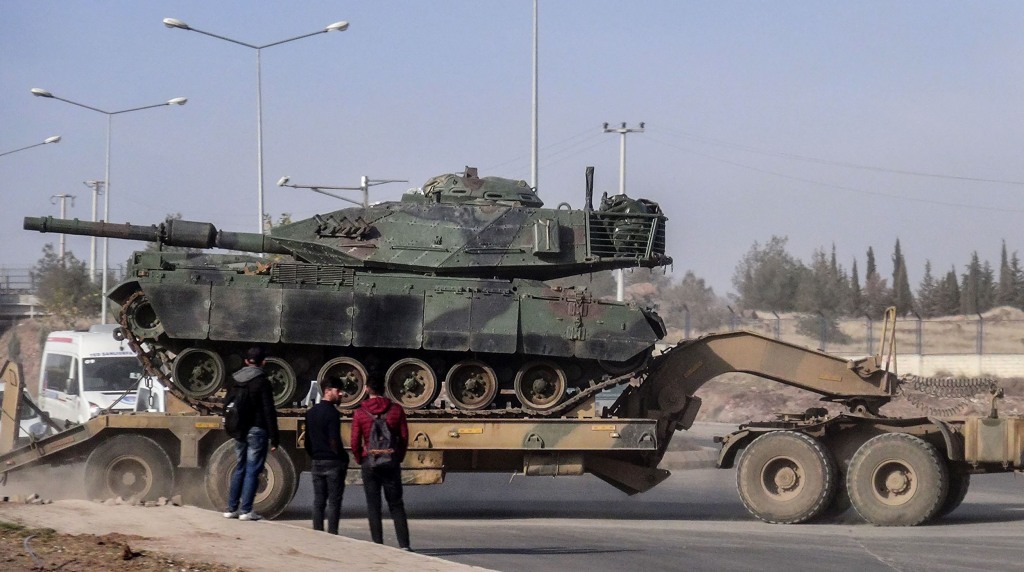LONDON — Relations between the U.S. and Turkey have hit a new low over Washington’s support of militias battling the Islamic State, according to analysts.
The government in Ankara views the Kurdish fighters as terrorists.
Experts warn that the crisis is resulting in Turkey — a longtime American ally with NATO’s second-largest standing army — turning away from the West and toward Russia and Iran.
U.S. military support for Syrian Democratic Forces (SDF), which are led by the Kurdish YPG militia, have left Turkey furious. Officials have even warned that Turkish troops are ready to cross into neighboring Syria.
“Nobody should expect Turkey to be patient anymore,” the country’s deputy prime minister, Bekir Bozdag, said Wednesday. Turkish President Recep Tayyip Erdogan has also warned of an imminent incursion into Kurdish-controlled Afrin in northwest Syria.
Turkey sees the YPG as an extension of the separatist Kurdistan Workers’ Party (PKK), which is considered a terrorist group by the U.S. and has fought a bloody insurgency since 1984 that has killed at least 35,000 people. With around one-fifth of Turkey’s population identifying as Kurdish, Turkey views the PKK and moves toward Kurdish independence regionally as an existential threat.

“The U.S. is directly providing arms to a group … whose ultimate ambition is not defeating ISIS,” said Ziya Meral, a Turkey analyst at the Centre for Historical Analysis and Conflict Research, a new British army think tank.
“This group’s ultimate ambition is creating an independent Kurdistan.”
Kurds in the region have long harbored hopes of forming their own state. In Iraq, the Kurdistan Regional Government held a referendum on independence in September. Kurdish voters overwhelmingly backed independence but the result prompted Iraqi government forces to dislodge Kurdish militia from disputed regions including the oil city of Kirkuk. The referendum also angered neighbors like Turkey as well as Iran, which also has a restive Kurdish minority.
Meral said that “mistakes committed” by the Turkish state in crushing the movement and trying to force the minority to assimilate have resulted in deep grievances among many Kurds.
Fadi Hakura, a Turkey specialist at Chatham House, a London-based think tank, said that there was still a “serious cognitive dissonance” between Turkish and American officials.
He compared the situation with the Kurds in Syria and southern Turkey to a hypothetical “violent separatist Mexican movement” on America’s southern border gaining traction among Hispanics in the United States.
“The United States is providing military and logistics to a group of Kurdish fighters that is closely linked to the PKK,” Hakura said. “The PKK is a separatist group that has used violence with the aim of achieving an independent Kurdish state. Naturally Turkey is apprehensive that a group of Syrian Kurdish fighters closely linked to the separatist Kurdish militants in Turkey is gaining a significant foothold in northern Syria.”
As ties with the West deteriorate, Turkey was increasingly focusing on relations with America’s rivals, he added.
“There is no doubt that declining relations with the United States will push Turkey closer into the arms of Russia and Iran,” Hakura said.
Last year, Ankara announced that it was purchasing Russian S-400 surface-to-air missile systems.
And on Thursday, Turkey announced that its chiefs of military staff and of intelligence had traveled to Russia to consult their counterparts ahead of a possible offensive in Syria, according to the state-run Anadolu news agency.
Turkish troops have been in Syria for about three months after entering northern Idlib Province following an agreement with Russia and Iran to try to reduce fighting between pro-Syrian government forces and rebel fighters.
Secretary of State Rex Tillerson appeared to try to assuage Turkish fears on Wednesday night.
“We are not creating a border security force at all,” he said, appearing to contradict an earlier announcement that the U.S.-led coalition would help set up a new 30,000-strong border force that includes the YPG. “What we are doing is we’re trying to ensure that local elements are providing security to liberated areas, and we still have.”
Tillerson said the issue of the border force been “misportrayed, misdescribed.”

“We have ISIS still attacking in parts of northwest Syria and along the Euphrates Valley, so this is just more training and trying to block ISIS from their escape routes,” he told reporters while traveling back to Washington from Vancouver where he had attended a meeting on North Korea.
Tillerson’s comments did not appear to lessen Turkish concerns.
“The practices of our NATO ally U.S. in Syria are unfortunately wrong and against the spirit of alliance,” Turkish Prime Minister Binali Yildirim said Thursday, according to Anadolu. “The U.S. should end confusion over the region’s future, and change its attitude toward peace and restoring relations with Turkey.”
It ultimately doesn’t matter whether the Kurdish forces the U.S. is working within Syria are a border force or not, according to Meral. He said the whole situation had prompted a huge sense of betrayal within Turkey.
“The problem now is that the campaign against ISIS has entered a new phase, that the U.S. military is posturing toward a long-term force and training a YPG militia is a direct challenge to Turkey,” Meral added.
The only way to bring Ankara back into the U.S. and NATO orbit was for Washington to fully understand why the Kurds are seen to pose an existential threat to Turkey and understand the impact the Syrian war was having on the country, according to Hakura.
“The United States is thousands of miles away from Syria whereas Turkey is on the border,” he said. “Syria is not a foreign policy for Turkey — it constitutes domestic policy.”
Source: https://www.nbcnews.com/news/world/russia-iran-open-their-arms-turkey-loses-patience-u-s-n838686
[Disclaimer]







